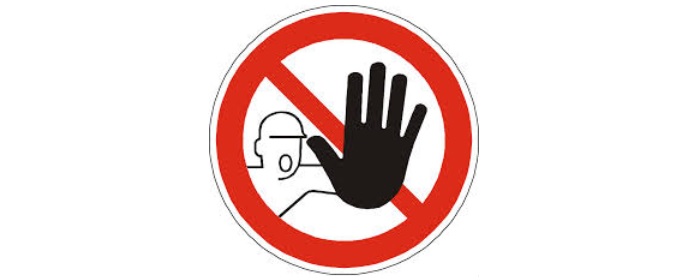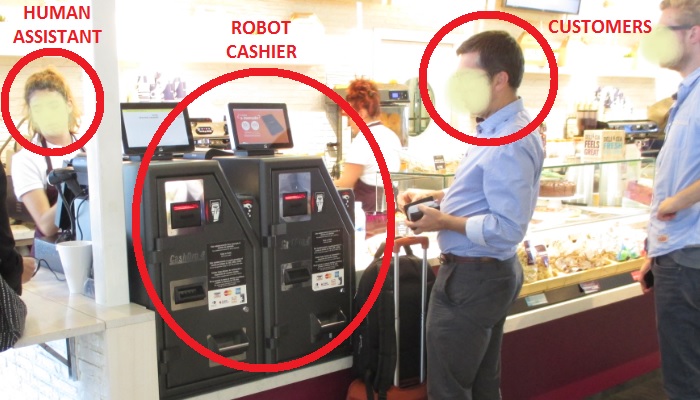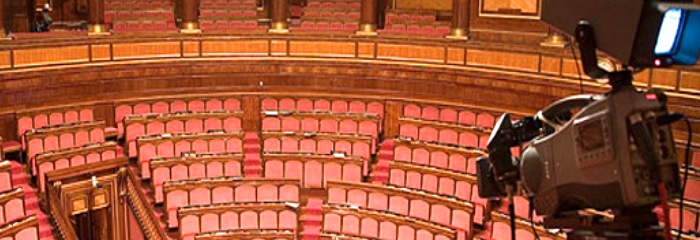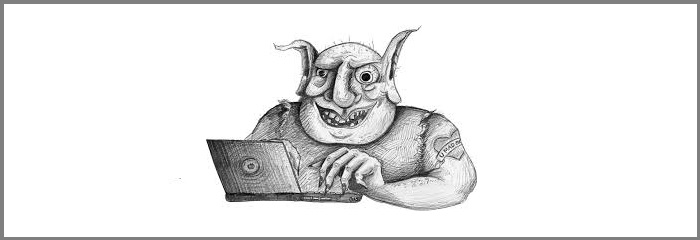The function of labor has changed profoundly in modern times: today it’s not about producing resources anymore, but rather about controlling the access to the resources. Incredibly, it seems like many people still have not noticed it.
 Unproductive labor
Unproductive labor
Every day a river of employees plunges into the traffic, and then they lock themselves 8 and more hours in the office… but practically they’re not producing anything. A minimal part of these workers, sure, really produces useful resources. Maybe they create innovative technological applications, or do research in the science field or nutrition field.
But unfortunately this minimal part is overshadowed, crushed by an enormous mass of employees who, in hours of fluff in front of the computers, doesn’t produce any concrete value for the society. I’ve also been part of this mass, and currently many of my relatives and friends are part of it, so I know well the feeling of “not having produced anything” and the end of a day in the office.
Why does this happen? Are the workers the cause, who are too lazy and demotivated, and who therefore in many hours of labor don’t produce anything worth noticing? Actually, just in minimal part. The main cause of the unproductivity are not the workers, but labor itself: it’s conceived bad, and even more importantly it’s not needed.
Labor is conceived bad
On the fact that the modern labor is conceived bad I’ve written already, so here I’ll be very brief.
The problem is that we insist in using a model of labor from the industrial age, obsolete, that was valid in the past, when an employee who was assigned to work at the lathe for 8 hours moving a handle, was really spending 8 hours moving the handle. But this model is still in use today, and applied to the intellectual labor, of concept, it doesn’t work. I will never repeat enough that the idea of carrying on intellectual labor for 8 and more hours a day is unrealistic.
There is the stubbornness to bind labor to the time that the worker actually spends working, like if the customers who buy a good/service would care about how many hours it was necessary to work to produce it. This bond doesn’t make a lot of sense, for a growing number of jobs. What makes sense, instead, is to bind labor to the value that is created and delivered to the customers.
Labor is not needed anymore
But there’s something even more interesting: the fact that labor is unproductive, actually, is not a problem. I know that this statement seems counterintuitive, but we need to consider that we reached a point, in history, where we don’t need to increase the production of resources, because there are already resources for everybody. As a matter of fact, there are definitely too many.
For example in terms of food. Currently we’re over 7 billion people on the planet, but we produce food to feed 12 billion. So we produce too much food and we throw it away, but we’re able anyway, in the meanwhile, to leave millions of people die of starvation (in Africa and other poor countries). The waste of the resource food has been put in numbers by a report published few years ago, that highlighted how a percentage between the 30 and 50% of the food produced on the planet never reaches a human stomach. And without consulting the numbers, we see it well in our houses and in the supermarkets: a lot of food is thrown away, too much.
And what can we say about the food for the mind? Even of this there is a lot, infinitely more than the amount that the current society seems to desire. The shelves of the libraries contain many great books, but the majority of people will not read any of these books, or at best just a handful, in an entire life. There are way more documentaries and interesting movies than those that the average person will ever watch, and the world is full of wonderful places (with natural and artistic beauties to be left breathless), but of these places the average person will see just a microscopic fraction in the span of a life.
My recent article “Rome vs Barcelona” (still unavailable in english), in fact, is born from my astonishment to realize that my city, Rome, is full of extraordinary places, and yet the majority of the people I know -many of them residing in Rome and surroundings-, has never seen them, and doesn’t even know they exist. They spend most of their time working (unproductively) and as consequence they don’t have a lot of residual time to “consume” the artistic resources of the city.
Another example is the resource house. Often there’s a discussion about the problems of those who don’t have a house, and have to live in the street, or the large families that live amassed in a couple of rooms. However it’s rarely pointed out that in the cities and in the towns there are a lot of empty houses, unused. Houses where nobody lives, and that are not even put on the market for renting by the owners.
These are few examples, but they should already make one thing evident: the truth is that today there is a disproportion between the amount of resources that the humanity has available (food, houses, art, knowledge, entertainment…), and the amount of these resources that are actually consumed: only a part is consumed, sometimes only a part which is ridiculously small.
For this reason the mantras repeated often by the politicians and the media, “we need to produce more” and “we need growth”, are a nonsense. Why should we worry about producing more, if the humanity already now has an immense patrimony of resources available, of various types, that is not used?
There’s not much sense in this river of workers that runs every day between the traffic and the office. Not only their labor is condemned from the start to be unproductive, because as I mentioned above it follows a model which is obsolete and absurd, but really it doesn’t even need to be, productive, because the humanity doesn’t need more resources.
All this labor is not useful anymore. Not to produce, at least, since the originary function of labor is over at this point.
Nevertheless people continue to work
Yes, nevertheless people continue to work, and even a lot. The big traffic snake activates every morning. The alarm, a coffee on the run, the nerves for the time spent in the traffic, and then hours and hours locked in the office, of which only a part to produce something useful, and the other part wasting time in meaningless activities. All of this should at least do “something”. All this labor should have some sort of function. And in fact it does have it.
The function has become to control the access to the resources.
 The fact that the resources exist in great abundance, in fact, it’s definitely not a guarantee that everybody is able to access them, not at all. Today for example a lot of people cannot afford to eat healthy food, to own a house, to increase their knowledge through books and documentaries, to explore the world. And if they cannot afford it’s because there is something that is keeping them at distance: it’s exactly their job.
The fact that the resources exist in great abundance, in fact, it’s definitely not a guarantee that everybody is able to access them, not at all. Today for example a lot of people cannot afford to eat healthy food, to own a house, to increase their knowledge through books and documentaries, to explore the world. And if they cannot afford it’s because there is something that is keeping them at distance: it’s exactly their job.
The job is the reason why people return in the evening tired at home, and don’t have mental energy to read a book or watch a documentary, so they end up watching the game shows on television.
The job is the reason why people don’t have time and energy to cook healthy food, which usually requires more time to be found and prepared, so they end up eating pre-packaged industrial foods, highly processed.
The job is the reason why people don’t have enough vacation days to leave their city to travel for some months around the world, so they end up having to be content of 2-3 weeks of freedom per year, in summer, in which obviously everything is more expensive: airplane tickets, hotels, entertainment of various types.
The job is the reason why people remain uninformed, too emtpied phisically and mentally in the evening to have the energy to search to alternative information to that provided by the mainstream television, and don’t see that it’s exactly the politicians and the heads of the corporations who decide that the resources have to be thrown away, rather than be made accessible to those who need them.
For example, the reason why a lot of house owners prefer to keep their properties closed and not rented, rather that putting them on the market, is that the government makes the renting not convenient. Between the high taxes and the zero support in case of infractions by the tenants, they created a system in which often is preferable to keep the resource house unused, rather than putting it on the market.
This is just one of the many modern paradoxical situations, but many workers don’t even notice these situations, because they are too absorbed by their job to wonder about the reality that surrounds them.
Keeping people busy and distracted, at this point this has become the predominant function of labor, since the old productive function is practically extinct. We arrived to a degree of development in which the essential resources, those that people concretely need (food, house, clothes, medicines and little more) are already produced by a small fraction of the world population for all the others, in great abundance, thanks to the support of the machines.
All the other workers instead, the big snake that runs every day between the traffic and the office, is dedicated to superfluous jobs, mostly unproductive, useful to auto-feed the big snake itself. From the banking industry, to the pharmaceutical industry (for the most part), to the corporations that produce processed food, to the various public offices, it’s definitely not a surprise that the workers return home in the evening and they can’t repress the feeling that they “haven’t concluded anything”: the fact is that there was nothing to conclude!
All that there was to do, actually, was to stay busy and distracted. And to achieve this their job helped brilliantly.
The advantages of unemployment
If you open your eyes, you will realize that today the people who struggle more to access the resources, those who for example struggle more to buy a house, or simply to maintain a healthy lifestyle, are exactly the people who spend more time in the big traffic snake. Those who hold their job tight as a precious, and who work a lot of hours.
To these people it’s often repeated that “working is the solution” to their problems, that by working more they will get more close to the resources that they desire. Instead, just the opposite is true: it’s exactly their working that is keeping them away from the resources. Their job is the problem. For example, it’s all those hours of work that take away from people the desire to discover what money is, how it’s produced, by who, how it works, taking them away as consequence the possibility to learn how to earn more.
Even if it’s continuously repeated everywhere, without applying any critical thinking, that “there’s the need of having a job” and that “we need to have more employment”, I think that today the entire society would have great benefits if unemployment would increase, significantly. Since a lot of labor today is unproductive and sterile, or maybe it is, productive, but produces anyway an excess of resources that is later thrown away, surely there would not be damanges if a lot of jobs would disappear.
There would be a lot of advantages instead: people would have more occasions to look around, inform themselves, to have a more complete vision of the reality they live in. They could prevent the diseases by maintaining a natural diet and a non stressful lifestyle, rather than curing the diseases after they manifest. They could tend to research, art, study. All activities, these, that would accelerate the development of the society, rather than its “growth“.
Because, it’s important to remark it, it’s from development that a society obtains well-being, not from “growth”. Infinite growth, on a planet with finite resources, doesn’t make sense. It’s just an empty slogan that the politicians repeat to carry on this system based on unproductive labor, because from its effects (the general lack of information in the population) only them, and few others who belong to corporations and media elites, get benefits.
The future belongs to unemployment
I want to try to answer to an interesting question: how will labor evolve in the future? Will people work as many hours as today?
 I leave the answer to this picture, that I’ve taken recently in the airport of Barcelona. It’s one of the bars that sell beverages and sandwiches to the travelers. At the cash desk there is not only the human cashier anymore, who manages the payment by the customers. No: between the human cashier and the customer a robot stepped in, and a quite cumbersome one. So the customer doesn’t pay directly in the hands of the human cashier anymore, but he puts the money inside the robot intermediary, and from the robot itself he gets the change.
I leave the answer to this picture, that I’ve taken recently in the airport of Barcelona. It’s one of the bars that sell beverages and sandwiches to the travelers. At the cash desk there is not only the human cashier anymore, who manages the payment by the customers. No: between the human cashier and the customer a robot stepped in, and a quite cumbersome one. So the customer doesn’t pay directly in the hands of the human cashier anymore, but he puts the money inside the robot intermediary, and from the robot itself he gets the change.
I found it amusing how the human cashier was almost buried behind the bulky robot, and I wondered how much time will pass before she will completely dissapear from there, leaving the robot alone to manage the transaction, in a completely independent way. Not much, probably.
In fact, even if the job of the cashier today is still mainly done by people, it’s quite easy to predict that in the future it will be almost exclusively done by the machines. The trend is already evident now in the supermarkets, where there is a constantly growing fraction of automatic cashiers that replace the cash counters with human operator.
For how many types of human jobs is this trend going on? A lot: essentially all the manual jobs, or those that require just a minimal logic ability, like accounting. For other jobs instead the shift still has to start. In the construction sector, for example, the buildings are still built with a lot of labor by the human workers, but it’s not difficult to imagine that soon also this job will disappear, and that the buildings will be “printed” with technologies like the 3D printers.
In the past we’ve seen the progressive extinction of a lot of human jobs, at a continuous rate, and I think that this rate will continue naturally in the future. The jobs that more rapidly will disappear will be the manual ones, while those with the highest chances of surviving will be the creative and artistic jobs, in which the human has the edge over the machines. And it’s exactly in this types of jobs that what counts is the value: the ideas, the intuition, the inspiration, the passion. All things that have little to do with the hours spent inside an office.
Even if a lot of people who have non creative jobs tend to be scared of change, opposing to the idea that their labor is not needed anymore (because the machines do it more efficiently and productively), the increase of unemployment is natural and physiological. It makes perfect sense that in the future people will work a lot less hours per week than what they do now.
A future scenario, toward which we can head, is one where more than now the machines will take care of producing the essential resources for people, while people will concentrate on activites aimed at development, like art, science and research. A scenario where the bound labor-income is very weak, and in which obviously those who will want to, will work a lot of hours per week, but they will do it for the passion, and not because forced by the financial system.
We are already heading toward this scenario, but in an incredibly painful way, at the expense of the enormous stress that many workers immersed in the traffic snake feel every day, and at the expense of their not being able to access the resources because they’re too busy working (unproductively) to access them.
Understanding that all this labor, at this point, has almost exclusively the function of social control, of regulating the access to resources that already exist in great abundance, is an essential step to facilitate the journey. Having read this article should have helped you taking it.
Note: The study mentioned about the waste of food is “Global food – Waste not, want not” by imeche.org.
Related: How to earn money without working, How to free yourself from the system













